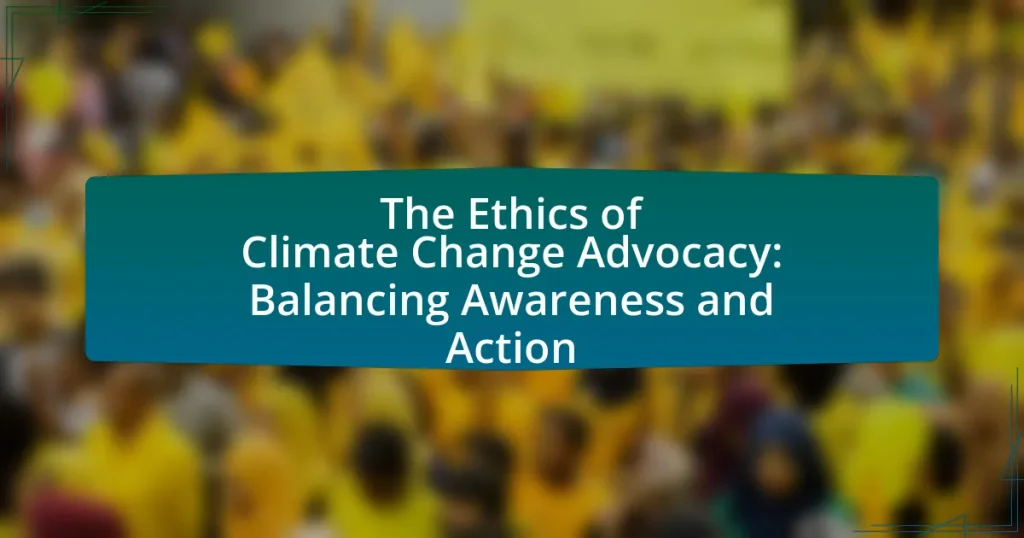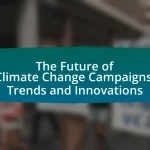The article focuses on the ethical considerations in climate change advocacy, emphasizing the importance of accurate information, inclusivity, and the representation of diverse perspectives. It explores how ethical frameworks, such as utilitarianism and deontology, influence advocacy strategies and the necessity of balancing awareness with action to drive effective climate solutions. Key stakeholders, including governments, NGOs, and the public, play a vital role in shaping advocacy efforts, while best practices for ethical advocacy include transparency, accountability, and respect for marginalized communities. The article also addresses the challenges advocates face, such as misinformation and public apathy, and highlights practical steps individuals can take to engage in ethical climate advocacy.
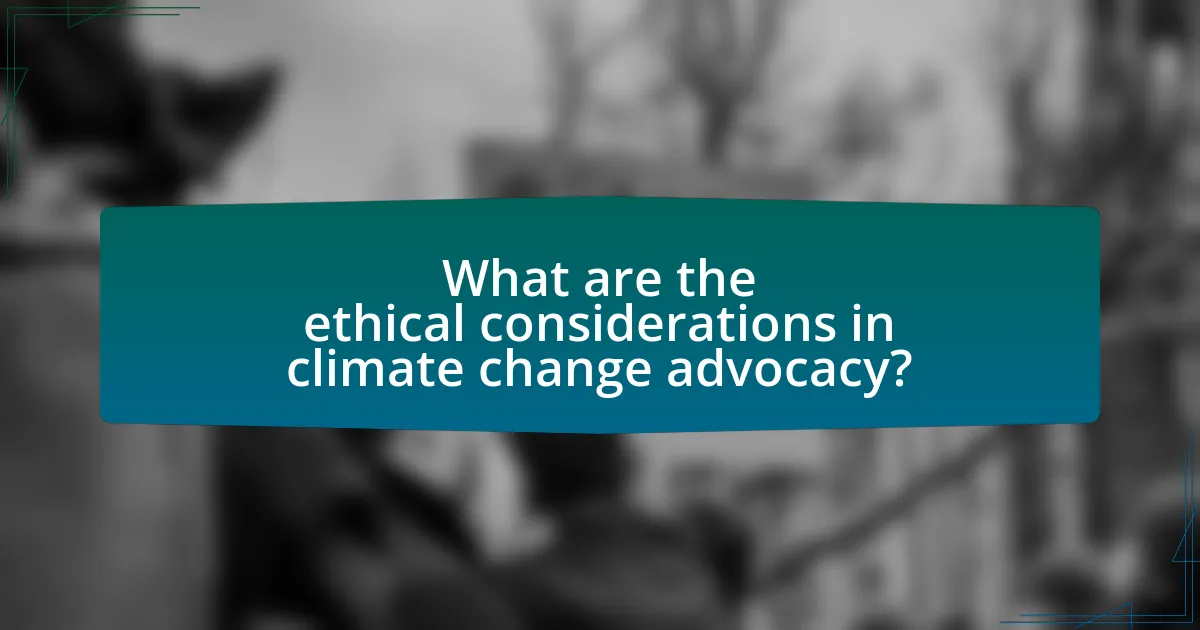
What are the ethical considerations in climate change advocacy?
Ethical considerations in climate change advocacy include the responsibility to provide accurate information, the potential for misinformation, and the need for inclusivity in representing diverse perspectives. Advocates must ensure that their messaging is based on scientific consensus, as misleading claims can undermine public trust and hinder effective action. For instance, the Intergovernmental Panel on Climate Change (IPCC) emphasizes the importance of relying on peer-reviewed research to inform policy and public understanding. Additionally, ethical advocacy requires acknowledging the voices of marginalized communities disproportionately affected by climate change, ensuring that their experiences and needs are integrated into advocacy efforts. This approach not only promotes justice but also enhances the effectiveness of climate action by fostering broader support and collaboration.
How do ethical frameworks influence climate change advocacy?
Ethical frameworks significantly influence climate change advocacy by shaping the values and principles that guide actions and policies. For instance, utilitarianism emphasizes the greatest good for the greatest number, which can drive advocacy efforts towards policies that maximize environmental benefits for the majority. In contrast, deontological ethics focuses on duties and rights, leading advocates to prioritize actions that uphold moral obligations to future generations and vulnerable populations. Research by the Intergovernmental Panel on Climate Change (IPCC) highlights that ethical considerations are crucial in framing climate policies, as they affect public perception and engagement. This interplay between ethics and advocacy is evident in movements that emphasize justice, equity, and responsibility, demonstrating how ethical frameworks can mobilize support and influence decision-making in climate action.
What are the main ethical theories relevant to climate change advocacy?
The main ethical theories relevant to climate change advocacy include utilitarianism, deontology, and virtue ethics. Utilitarianism focuses on maximizing overall happiness and minimizing suffering, which in the context of climate change, emphasizes actions that lead to the greatest good for the largest number of people, such as reducing carbon emissions to prevent global warming. Deontology, on the other hand, emphasizes the importance of duty and moral rules, suggesting that individuals and organizations have a moral obligation to protect the environment regardless of the consequences. Virtue ethics highlights the importance of character and moral virtues, advocating for a lifestyle that embodies environmental stewardship and responsibility. These theories provide a framework for understanding the moral implications of climate change actions and the responsibilities of individuals and societies in addressing this global issue.
How do these theories apply to real-world climate advocacy scenarios?
Theories of climate change advocacy, such as the ethics of care and utilitarianism, apply to real-world scenarios by guiding the strategies and actions of advocates. For instance, the ethics of care emphasizes the importance of relationships and responsibilities towards vulnerable populations affected by climate change, leading advocates to prioritize policies that protect marginalized communities. Utilitarianism, on the other hand, encourages actions that maximize overall well-being, prompting climate advocates to support initiatives that yield the greatest environmental benefits for the largest number of people. Evidence of these applications can be seen in campaigns that focus on equitable climate solutions, such as the Green New Deal, which aims to address both climate change and social justice, demonstrating a practical integration of ethical theories into advocacy efforts.
Why is balancing awareness and action crucial in climate change advocacy?
Balancing awareness and action is crucial in climate change advocacy because it ensures that informed public engagement translates into effective policy and behavioral changes. Awareness raises understanding of climate issues, while action drives tangible solutions; without this balance, advocacy efforts may lead to apathy or ineffective responses. For instance, a study by the Intergovernmental Panel on Climate Change (IPCC) highlights that increased public awareness correlates with greater support for climate policies, demonstrating that informed citizens are more likely to advocate for and implement necessary changes. Thus, the interplay between awareness and action is essential for fostering a proactive approach to climate change.
What are the potential consequences of prioritizing awareness over action?
Prioritizing awareness over action can lead to stagnation in addressing climate change, as increased awareness without corresponding action fails to produce tangible results. This phenomenon can create a false sense of progress, where individuals and organizations believe that simply raising awareness is sufficient to combat climate issues. Research indicates that while awareness campaigns can inform the public, they often do not translate into behavioral changes or policy implementations necessary for effective climate action. For instance, a study published in the journal “Environmental Science & Policy” found that awareness alone does not significantly influence individuals’ willingness to engage in sustainable practices or support climate policies. Consequently, the lack of action can exacerbate environmental degradation, delay necessary interventions, and ultimately undermine the urgency required to address the climate crisis effectively.
How can action-oriented approaches enhance awareness efforts?
Action-oriented approaches enhance awareness efforts by actively engaging individuals and communities in tangible activities that promote understanding and commitment to climate change issues. These approaches, such as community clean-up events or tree-planting initiatives, create direct experiences that foster a deeper connection to environmental challenges. Research indicates that participation in hands-on activities significantly increases knowledge retention and emotional investment in climate issues, as evidenced by a study published in the Journal of Environmental Psychology, which found that individuals who participated in action-oriented programs reported a 40% increase in their understanding of climate change compared to those who only received informational materials. Thus, action-oriented strategies not only raise awareness but also empower individuals to become advocates for change.
What role do stakeholders play in ethical climate change advocacy?
Stakeholders play a crucial role in ethical climate change advocacy by influencing policies, mobilizing resources, and shaping public perception. Various stakeholders, including governments, businesses, non-governmental organizations, and communities, collaborate to promote sustainable practices and advocate for climate justice. For instance, the Paris Agreement, adopted by nearly 200 countries, exemplifies how governmental stakeholders commit to reducing greenhouse gas emissions through collective action. Additionally, businesses increasingly adopt corporate social responsibility initiatives, demonstrating their commitment to ethical practices that address climate change. Research by the World Resources Institute highlights that stakeholder engagement is essential for effective climate action, as it fosters transparency and accountability in decision-making processes.
Who are the key stakeholders in climate change advocacy?
Key stakeholders in climate change advocacy include governments, non-governmental organizations (NGOs), businesses, scientists, and the general public. Governments play a crucial role by enacting policies and regulations aimed at reducing greenhouse gas emissions. NGOs, such as Greenpeace and the World Wildlife Fund, mobilize public support and raise awareness about climate issues. Businesses, particularly those in energy, transportation, and agriculture, influence climate action through sustainable practices and corporate social responsibility initiatives. Scientists provide essential research and data that inform policy decisions and public understanding of climate change. The general public, through grassroots movements and individual actions, drives demand for change and holds stakeholders accountable. These groups collectively shape the discourse and actions surrounding climate change advocacy, making their involvement vital for effective solutions.
How do stakeholder interests shape ethical considerations in advocacy?
Stakeholder interests significantly shape ethical considerations in advocacy by influencing the priorities and values that guide advocacy efforts. For instance, when stakeholders such as environmental groups, businesses, and government entities have conflicting interests, the ethical framework of advocacy must navigate these tensions to ensure that the advocacy remains credible and aligned with broader societal values. Research indicates that advocacy strategies often reflect the power dynamics among stakeholders, where those with greater influence can dictate the ethical narrative, potentially sidelining marginalized voices. This dynamic is evident in climate change advocacy, where corporate interests may prioritize economic growth over environmental sustainability, thus complicating ethical decision-making.
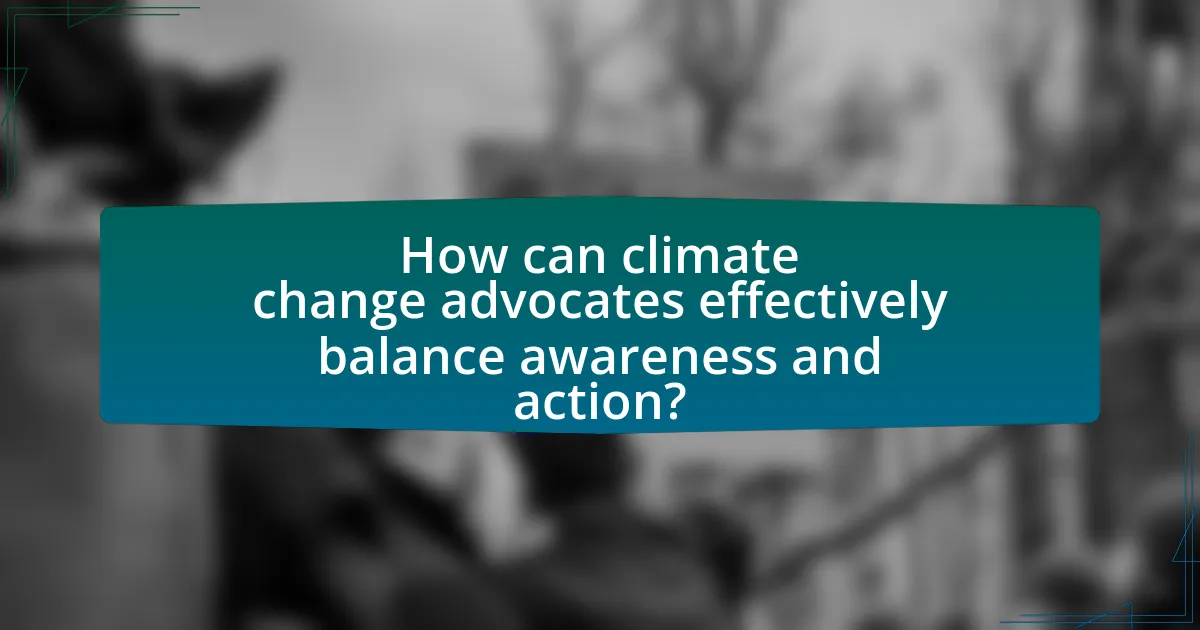
How can climate change advocates effectively balance awareness and action?
Climate change advocates can effectively balance awareness and action by integrating educational campaigns with actionable initiatives. This approach ensures that while raising public consciousness about climate issues, advocates simultaneously provide clear pathways for individuals and communities to engage in sustainable practices. For instance, organizations like the Sierra Club combine awareness efforts, such as public seminars and social media campaigns, with direct action opportunities, including community clean-up events and lobbying for policy changes. This dual strategy not only informs the public but also empowers them to contribute to climate solutions, thereby reinforcing the connection between knowledge and tangible impact.
What strategies can be employed to raise awareness while promoting action?
Effective strategies to raise awareness while promoting action include utilizing social media campaigns, engaging community events, and leveraging partnerships with influential organizations. Social media campaigns can reach a broad audience quickly; for instance, the #FridaysForFuture movement mobilized millions globally, demonstrating the power of digital platforms in raising awareness and prompting action. Community events, such as local clean-up drives or educational workshops, foster direct engagement and encourage participants to take actionable steps toward sustainability. Collaborating with influential organizations, like the World Wildlife Fund, can amplify messages and resources, as seen in their campaigns that combine awareness with actionable initiatives, leading to increased public participation in conservation efforts. These strategies effectively intertwine awareness and action, driving meaningful change in climate advocacy.
How can social media be leveraged for effective climate advocacy?
Social media can be leveraged for effective climate advocacy by facilitating widespread awareness, mobilizing communities, and enabling real-time engagement. Platforms like Twitter, Facebook, and Instagram allow advocates to share information rapidly, reaching millions and amplifying messages about climate change. For instance, the hashtag #FridaysForFuture, initiated by Greta Thunberg, successfully mobilized global youth protests, demonstrating the power of social media in organizing collective action. Additionally, studies show that social media campaigns can increase public engagement and support for climate policies, as seen in the 2019 Global Climate Strike, which garnered participation from over 4 million people worldwide. This illustrates how social media serves as a critical tool for advocacy, driving both awareness and action in the fight against climate change.
What role does education play in fostering both awareness and action?
Education plays a crucial role in fostering both awareness and action regarding climate change. It equips individuals with knowledge about environmental issues, enabling them to understand the complexities of climate change and its impacts. For instance, studies show that educational programs focused on sustainability can significantly increase awareness levels among students, leading to proactive behaviors such as reducing carbon footprints and advocating for policy changes. Research conducted by the National Environmental Education Foundation indicates that 70% of students who received climate education reported taking action to mitigate climate change, demonstrating the direct correlation between education and active engagement in environmental advocacy.
What challenges do advocates face in balancing awareness and action?
Advocates face significant challenges in balancing awareness and action, primarily due to the risk of overwhelming audiences with information while simultaneously motivating them to take concrete steps. This challenge is exacerbated by the complexity of climate change issues, which can lead to apathy or disengagement among the public. Research indicates that when individuals are inundated with alarming statistics or dire predictions, they may experience a sense of helplessness, which can hinder their willingness to act. For instance, a study published in the journal “Environmental Communication” highlights that effective advocacy requires not only raising awareness but also providing clear, actionable steps that individuals can take, thereby bridging the gap between knowledge and action.
How can misinformation impact climate change advocacy efforts?
Misinformation can significantly undermine climate change advocacy efforts by creating confusion and eroding public trust in scientific consensus. When false information circulates, it can lead to misinformed beliefs about climate change, such as questioning its existence or the urgency of action needed. For instance, a study published in the journal “Nature” found that exposure to misinformation can decrease individuals’ willingness to support climate policies by up to 30%. This distortion of facts hampers effective communication and mobilization, ultimately slowing down necessary actions to combat climate change.
What are the barriers to effective action in climate change advocacy?
Barriers to effective action in climate change advocacy include political inertia, lack of funding, and public apathy. Political inertia arises from the reluctance of policymakers to implement necessary changes due to fear of backlash from constituents or industries. Lack of funding limits the capacity of advocacy groups to conduct research, mobilize communities, and influence policy. Public apathy is driven by a disconnect between climate change impacts and individual experiences, leading to insufficient public pressure for action. According to a 2021 report by the Intergovernmental Panel on Climate Change, urgent and coordinated global action is essential, yet these barriers hinder progress significantly.
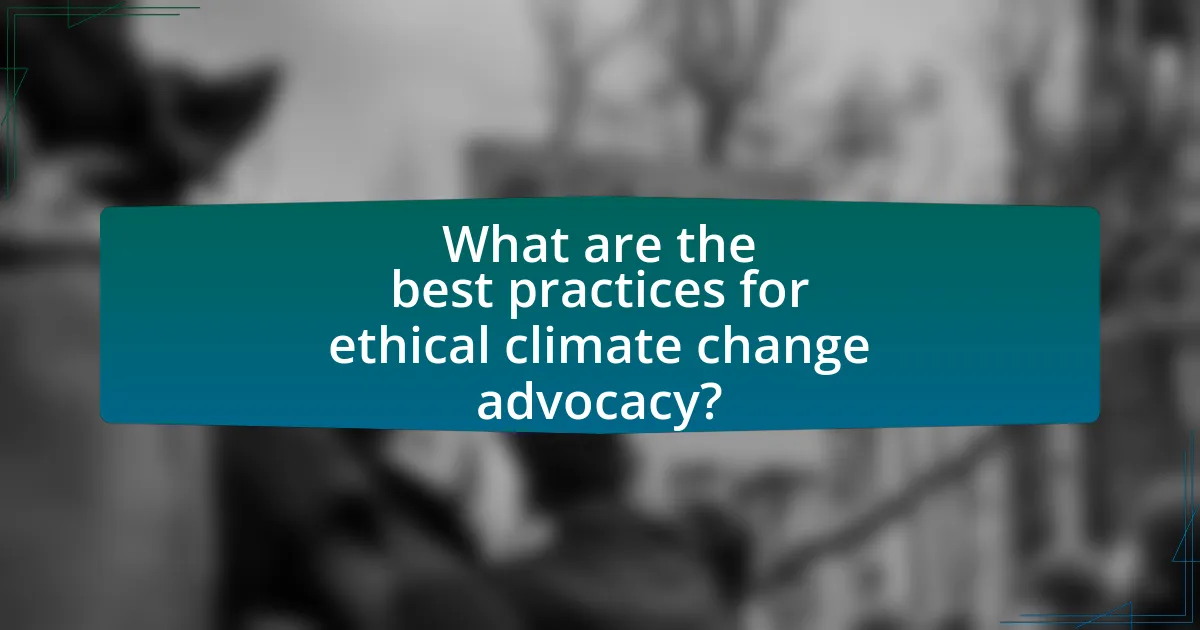
What are the best practices for ethical climate change advocacy?
The best practices for ethical climate change advocacy include transparency, inclusivity, and evidence-based messaging. Transparency involves openly sharing the motivations, funding sources, and potential conflicts of interest behind advocacy efforts, which builds trust with the audience. Inclusivity ensures that diverse voices, particularly those from marginalized communities most affected by climate change, are represented in advocacy efforts, fostering a more comprehensive understanding of the issue. Evidence-based messaging relies on scientifically accurate information to inform the public and policymakers, as demonstrated by the Intergovernmental Panel on Climate Change (IPCC) reports, which provide a robust foundation for climate advocacy. These practices collectively enhance the credibility and effectiveness of climate change advocacy initiatives.
How can advocates ensure their messaging is ethical and effective?
Advocates can ensure their messaging is ethical and effective by adhering to principles of honesty, transparency, and respect for diverse perspectives. Ethical messaging requires that advocates present accurate information, avoiding exaggeration or misinformation, which can undermine credibility and trust. For instance, a study published in the journal “Environmental Communication” highlights that clear, factual communication significantly enhances public understanding and engagement in climate issues. Additionally, effective messaging involves actively listening to and incorporating feedback from various stakeholders, ensuring that the concerns and values of different communities are respected and represented. This approach not only fosters inclusivity but also strengthens the overall impact of advocacy efforts.
What guidelines should be followed to maintain ethical integrity in advocacy?
To maintain ethical integrity in advocacy, individuals and organizations should adhere to transparency, honesty, accountability, and respect for all stakeholders. Transparency involves openly sharing information about funding sources, methodologies, and potential conflicts of interest, which fosters trust and credibility. Honesty requires advocates to present facts accurately and avoid exaggeration or manipulation of data, as seen in the guidelines set by the American Psychological Association, which emphasizes the importance of truthful representation in advocacy efforts. Accountability entails being answerable for actions and decisions, ensuring that advocates can justify their positions and strategies to the public and stakeholders. Lastly, respect for all stakeholders, including marginalized communities, ensures that advocacy efforts do not exploit or misrepresent the voices of those affected by climate change, aligning with ethical standards outlined by organizations like the International Association for Public Participation.
How can transparency enhance trust in climate change advocacy efforts?
Transparency enhances trust in climate change advocacy efforts by providing clear, accessible information about the goals, methods, and outcomes of initiatives. When organizations openly share data, methodologies, and decision-making processes, stakeholders can verify claims and assess the credibility of the advocacy efforts. For instance, a study by the Yale Program on Climate Change Communication found that transparency in reporting climate data significantly increases public trust in climate-related organizations. This trust is crucial for mobilizing support and fostering collaboration among diverse groups, ultimately leading to more effective climate action.
What practical steps can individuals take to engage in ethical climate advocacy?
Individuals can engage in ethical climate advocacy by adopting sustainable practices, such as reducing personal carbon footprints through energy conservation, using public transportation, and minimizing waste. These actions contribute to a collective effort in combating climate change. For instance, a study by the Global Carbon Project indicates that individual lifestyle changes can significantly lower greenhouse gas emissions, with transportation and energy use being major contributors. Additionally, individuals can support and participate in local environmental organizations, advocate for policy changes, and educate others about climate issues, thereby amplifying their impact.
How can grassroots movements contribute to ethical climate change advocacy?
Grassroots movements can significantly contribute to ethical climate change advocacy by mobilizing local communities to engage in sustainable practices and influence policy changes. These movements often prioritize inclusivity and social justice, ensuring that marginalized voices are heard in climate discussions. For instance, the Sunrise Movement in the United States has successfully advocated for the Green New Deal, emphasizing the need for equitable solutions to climate issues. Research indicates that grassroots initiatives can lead to increased public awareness and support for climate policies, as seen in the rise of community-led renewable energy projects, which not only reduce carbon footprints but also empower local economies.
What resources are available for advocates seeking to improve their practices?
Advocates seeking to improve their practices can access a variety of resources, including training programs, online courses, and toolkits specifically designed for climate change advocacy. Organizations such as the Climate Reality Project offer comprehensive training sessions that equip advocates with the necessary skills and knowledge to effectively communicate climate issues. Additionally, platforms like Coursera and edX provide online courses on climate science and advocacy strategies, allowing advocates to learn at their own pace. Toolkits from entities like the Sierra Club offer practical guidance on organizing campaigns and engaging communities. These resources are validated by their widespread use in the advocacy community, demonstrating their effectiveness in enhancing advocacy practices.
